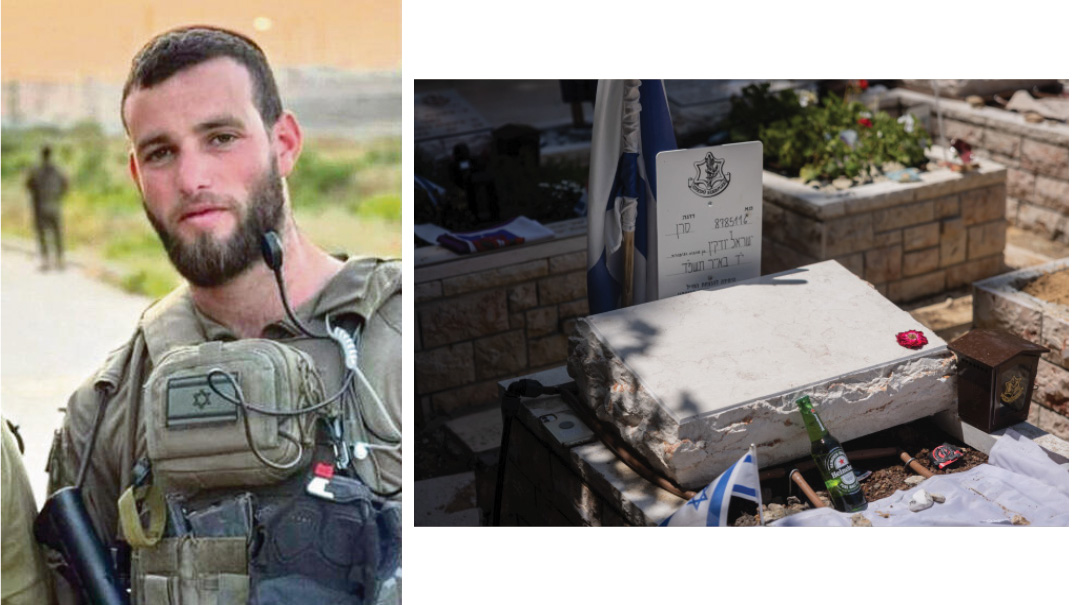A Painful Empty Tombstone

Faced with the refusal to include Hy”d, the Yudkin family decided to leave the tombstone blank

Photos: Flash90
IN the middle of an existential war and a societal clash around military service, the inscription on one matzeivah has sparked a storm that highlights the gulf between the IDF and the chareidi values of some of its soldiers. The case that ignited this controversy is that of Captain Yisrael Yudkin, a deputy company commander in the religious Netzach Yehuda battalion from Kfar Chabad, who fell in battle in the Gaza Strip on May 22. Following his death, the Defense Ministry proposed to the Yudkin family that he be buried in the Mount Herzl military cemetery, something they explained was considered an honor. However, the family’s hopes were dashed by the proposal’s outcome.
“At first, there was a back-and-forth about what to put on the tombstone,” Tzipi Yudkin, Israel’s mother, told Mishpacha. “The problem arose when we requested Hy”d, as has been the custom for centuries when a Jew is killed at the hand our enemies. They refused.”
Tzipi explained that the refusal did not come from the IDF — “they always maintained a good dialogue with us and respected us” — but from the Defense Ministry. “There was no one to talk to, they treated me very disrespectfully.”
Faced with the refusal to include Hy”d, the Yudkin family decided to leave the tombstone blank, a situation that painfully persists.
It was Yisrael’s brother, Dovi, who decided to take action, reaching out to political figures to fulfill his family’s wish. Ironically, his cause was embraced by one of the forces historically at odds with the Orthodox world in Israeli politics: Avigdor Lieberman’s Yisrael Beiteinu party.
“I am not a religious woman, but this issue transcends my personal stance,” MK Yulia Malinovsky of Yisrael Beitenu told Mishpacha. “It is a disgrace that a soldier who fell defending the Land of Israel from its enemies has a blank tombstone to this day.”
Malinovsky stated she had submitted a bill, already signed by 26 other MKs, to allow the Yudkin family to fulfill their wish. The law change would permit the families of any fallen soldier to inscribe whatever they wish on the tombstone, provided it does not “include expressions that might affect the values of the State of Israel as a Jewish and democratic country, or offend another’s sensibilities, and is within the scope of texts traditionally written on tombstones.”
This bill comes at a time of heightened sensitivity surrounding the chareidi draft. The High Court recently endorsed the call to draft yeshivah students, yet cases like that of Yisrael Yudkin seem to demonstrate that chareidim will not be warmly welcomed in the army.
“One ends up believing that this is all politics, and that they do not really want chareidim in the army,” Tzipi Yudkin asserted. “Why claim to want chareidim if, when one of them dies in battle, they don’t even afford him the basic honor of respecting his wish, following Jewish tradition, to have Hy”d inscribed?”
MK Malinovsky also argued that rejecting the Yudkin family’s request is a failure to understand that the army needs to make changes if it intends to incorporate chareidim.
“Let me be very clear: I want chareidim to join the army,” the MK told Mishpacha. “For that very reason, I understand that certain adaptations and modifications in some areas are necessary for this sector of society to integrate into the IDF.”
Faced with the Defense Ministry’s refusal to inscribe Hy”d on Yisrael’s tombstone, the Yudkin family even considered exhuming the soldier’s body and transferring it to another cemetery. “It crossed our minds, but for now, we have faith that we will reach a satisfactory resolution.”
MK Malinovsky agreed: “I believe the Defense Ministry will accept this change. I even hope the law passes and can be approved in Yisrael’s honor. The last thing we want is for the body of a soldier who died defending Israel to be removed from the cemetery. That would be a great sorrow for the family and a disgrace for the State.”
(Originally featured in Mishpacha, Issue 1018)
Oops! We could not locate your form.







